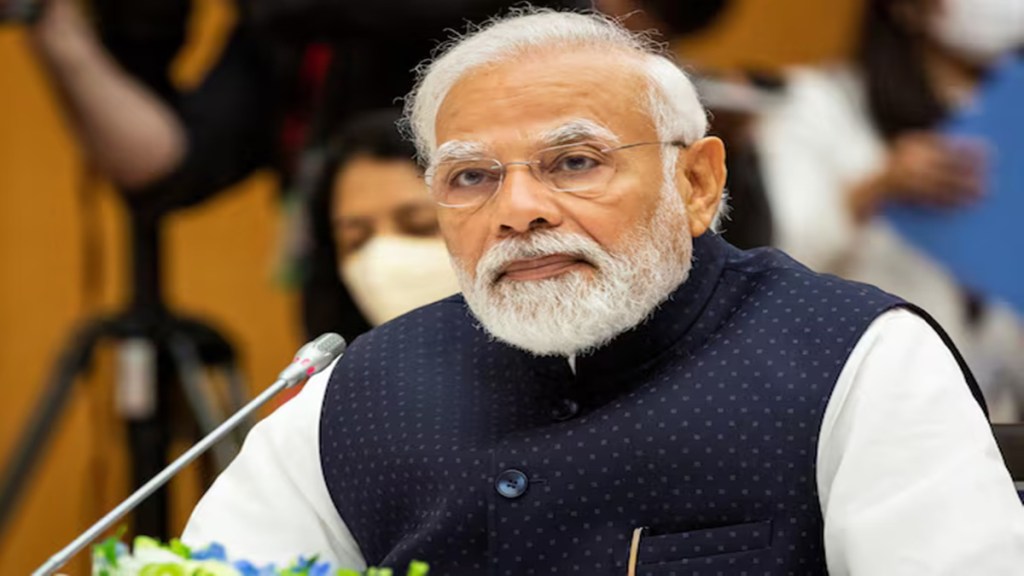The work done and measures taken by the new government in the first 100 days of its coming to power gives a reflection of the speed and scale in the sectors necessary for India’s fast paced development, Prime Minister Narendra Modi said on Monday.
Speaking at the inauguration of 4th Global Renewable Energy Investors Meet and Expo (RE-INVEST), the prime minister noted that in the first 100 days, multiple decisions have been taken to expand the physical and social infrastructure of the nation.
“Government’s work in the first 100 days highlights its priorities and gives a reflection of the speed and scale”, Modi said adding that all sectors necessary for India’s fast-paced development have been emphasized.
Separately, speaking to a TV channel, finance minister Nirnala Sitharaman listed out the Unified Pension Scheme for government staff, the “five schemes” to generate employment opportunities for 41 million youth and “reformatory steps” to support the MSMEs, as the key achievements during the first 100 days of the Modi 3.0 government.
Highlighting the government’s work during these days, Modi said that India is on the path to constructing 7 crore houses which is more than the population of many countries, while 4 crore houses have been handed out to the people in the last two terms.
Talking about the developments in the green energy sector in the last 100 days, Modi noted the initiation of a viability gap funding scheme for offshore wind energy projects worth more than Rs 7,000 crore and the target of producing 31,000 MW of hydropower in the coming times with an outlay of Rs 12,000 crore.
In sectors other than green energy, the prime minister lauded the government’s decision to create 12 new industrial cities, approval for 8 high-speed road corridor projects, launching of more than 15 semi-high speed Vande Bharat trains, and the inception of a research fund worth Rs 1 trillion to promote research. Among other measures taken by the government in the last 100 days, Modi highlighted the government’s various initiatives to drive e-mobility, promotion of high-performance biomanufacturing and approval to Bio E3 policy.
The prime minister also announced that the government has identified 17 cities in India to be developed as solar cities in its aim to increase the penetration of renewable energy. He also said that the government is aiming to make Ayodhya, a model solar city.
Amid growing demand for energy and efforts to reduce dependence on fossil fuels, the government is aiming at enhancing the renewable energy capacity and be able to meet the target of 500 gigawatt (GW) of non-fossil fuel capacity by 2030.
“Not just India, the whole world is of the belief that India is the best bet of the 21st century”, Modi said.
Talking about the recently launched scheme for rooftop solar – PM Surya Ghar Free Electricity Scheme, Modi said that every household in India will become a power producer. He informed that more than 1 crore 30 lakh families have registered under the scheme and installation work has been completed in 3.25 lakh houses so far.
“People will benefit by about Rs 25,000 from the electricity bill,” Modi said, noting that money saved is money earned.
He said that the scheme is becoming a medium of employment generation and environment protection generating around 2 million jobs. The government aims to prepare 3 lakh youth as skilled manpower under this scheme. “Out of these, one lakh youth will be solar PV technicians. Every 3 kilowatts of solar electricity generated will prevent emission of 50-60 tonnes of carbon dioxide,” he said.
In the last decade, India had generated 35% more electricity from nuclear energy as compared to before and India was striving to become a global leader in the field of green hydrogen, Modi said. Stressing on the measures taken to address the challenges related to critical minerals, he mentioned that the government is promoting a circular approach along with lending support to start-ups to develop better technology related to re-use and recycling.
“India has set a target of making its railways net zero by the end of this decade and has decided to achieve the target of 20% ethanol blending in petrol by 2025.”
Noting the increasing demand for renewable energy in the country, Modi said that the government is formulating new policies to meet this demand and providing support in every way.
He also highlighted the tremendous opportunities for investors in the energy generation and the manufacturing sector. “India is striving for complete Made in India solutions and creating many possibilities. India is truly a guarantee of expansion and better returns,” he said.
